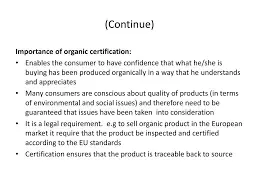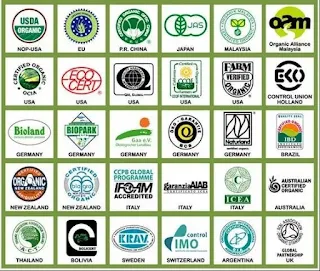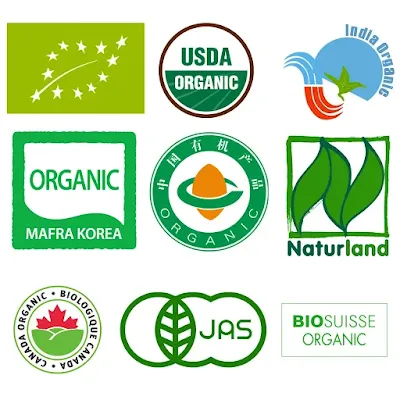The Importance of Organic Certification: Ensuring Quality and Sustainability
In today's health-conscious and environmentally aware world, the demand for organic products has grown significantly. Consumers are becoming more conscious of the food they consume and the impact their choices have on the environment. As a result, obtaining organic certification has become a crucial step for businesses in the agriculture and food sectors. Quality Management System in Nepal Pvt. Ltd. recognizes the significance of organic certification in promoting sustainable practices and ensuring product quality.
What is Organic Certification?
Organic
certification is a process by which a third-party organization verifies that
products, such as agricultural produce and food items, are produced using
organic farming methods. These methods exclude the use of synthetic pesticides,
chemical fertilizers, genetically modified organisms (GMOs), and other harmful
substances. Organic certification also encompasses environmentally friendly
practices that promote soil health, biodiversity, and animal welfare.
Benefits of Organic Certification
·
Credibility and Trust: Organic certification provides credibility to businesses, assuring
consumers that the products they purchase adhere to strict organic standards.
Quality Management System in Nepal Pvt.Ltd. ensures that businesses meet the necessary
criteria for organic certification, building trust with consumers.
·
Higher Market Demand: As consumers increasingly seek healthier and more sustainable options,
products with organic certification experience higher demand. Businesses that
obtain organic certification can tap into this growing market and gain a
competitive edge.
·
Environmental Conservation: Organic farming methods promote sustainable agriculture by
reducing soil degradation, conserving water, and preserving biodiversity. This
contributes to the long-term health of ecosystems and helps combat climate
change.
·
Health Benefits:
Organic products are generally free from synthetic chemicals and pesticides,
reducing the risk of health issues related to chemical residues. This is a
significant selling point for health-conscious consumers.
·
Supporting Local Communities: Organic farming often involves smaller, local producers. By
obtaining organic certification, businesses contribute to the growth of local
economies and support small-scale farmers.
What are the Opportunities for Organic Certification in Nepal (OCN)?
Growing
Global Demand: The
international market for organic products is expanding rapidly. OCN opens doors
for Nepalese farmers to tap into this lucrative market and gain a competitive
edge.
Preservation
of Ecosystems:
Organic farming practices prioritize the health of the soil, water, and
surrounding ecosystems. Nepal's diverse landscapes provide ample opportunities
for organic farming, contributing to the preservation of its unique
biodiversity.
Health
and Well-being:
Organic products are cultivated without synthetic pesticides and chemicals. OCN
promotes healthier food choices, reducing the risks associated with consuming
harmful residues.
Community
Empowerment: Organic
farming often involves local communities, empowering them economically and
socially. OCN encourages small-scale farmers to adopt sustainable practices,
enhancing their livelihoods.
Tourism
and Agritourism:
Nepal's organic farms can attract eco-conscious tourists interested in
experiencing sustainable agriculture firsthand. OCN can help establish a link
between agriculture and tourism, boosting rural economies.
How do we get Organic Certification?
Obtaining
organic certification is a process that involves several steps, all aimed at
verifying that products are produced using organic farming methods and
practices. Here's a simplified breakdown of how to achieve organic certification:
·
Preparation and Documentation: The first step involves ensuring that all necessary
documentation is in order. This includes detailing the production process, the
type of organic practices being employed, and the list of inputs and materials
used.
·
Application Submission: Businesses must submit an application for organic
certification to a recognized certifying body like ISO Certification Pvt. Ltd.
The application should include the relevant documentation and information about
the products and practices.
·
Inspection: A
thorough inspection of the production facility and practices is conducted by
qualified inspectors. This on-site evaluation ensures that the methods used
align with organic standards and regulations.
·
Review and Approval: After the inspection, the certifying body reviews the findings and the
submitted documentation. If everything is in compliance with organic standards,
the business is granted organic certification.
· Annual Recertification: Organic certification is not a one-time achievement. Businesses need to undergo an annual recertification process to ensure that they continue to meet the established organic standards.
What are the Requirements of Organic Certification?
Organic
certification comes with a set of stringent requirements to ensure that
products are genuinely organic. Some key requirements include:
·
No Synthetic Chemicals: Organic practices prohibit the use of synthetic chemicals,
including pesticides, fertilizers, and growth hormones.
·
Soil Health:
Organic farms must prioritize soil health through practices like crop rotation,
composting, and reduced soil disturbance.
·
Biodiversity:
Preserving and enhancing biodiversity is crucial in organic farming. This
involves planting diverse crops and avoiding monocultures.
·
Animal Welfare:
For products involving animals, organic certification requires humane
treatment, access to outdoor spaces, and organic feed.
· Traceability: Certified organic products must be traceable from farm to table, ensuring transparency and authenticity.
How Does Organic Certification Nepal Help with Organic Certification?
ISO
Certification Pvt. Ltd. serves as a valuable partner for businesses seeking
organic certification in Nepal. Here's how they assist:
·
Guidance: The
certification process can be complex. ISO Certification Pvt. Ltd. offers expert
guidance, ensuring that businesses understand the requirements and steps
involved.
·
Inspection Services: The organization conducts thorough inspections to verify that businesses
adhere to organic practices and standards.
·
Documentation Support: ISO Certification Pvt. Ltd. assists in preparing the
necessary documentation, helping businesses present a comprehensive and
accurate representation of their practices.
·
Credibility:
Being certified by a reputable certification body like ISO Certification Pvt.
Ltd. lends credibility to a business's organic claims, boosting consumer trust
and marketability.
·
Networking:
ISO Certification Pvt. Ltd. provides a platform for businesses to connect with
others in the organic industry, fostering collaboration and knowledge sharing.
What are the Challenges for Organic Certification in Nepal (OCN)?
·
Lack of Awareness: Many farmers are unaware of the benefits of organic farming and certification.
OCN faces the challenge of educating farmers about sustainable practices and
the value of certification.
·
Limited Resources: Transitioning to organic farming requires investment in training,
infrastructure, and resources. Many farmers, especially those in remote areas,
face challenges in accessing these necessities.
·
Inconsistent Standards: Maintaining consistent organic standards across different
regions can be difficult. OCN needs to establish uniform guidelines that cater
to Nepal's diverse agro-climatic conditions.
·
Market Access:
While the global market for organic products is promising, accessing it with
Nepalese organic goods can be a hurdle due to trade barriers, certifications
costs, and stringent regulations.
·
Certification Process Complexity: The certification process itself can be intricate and
time-consuming. OCN must simplify procedures while maintaining the integrity of
the certification.
What are the Principles of Organic Certification?
Ecological Balance
- The
farming practices should aim to work in harmony with the natural
environment, promoting ecological balance and conserving biodiversity.
Soil Health
- A core
principle is to improve soil fertility over the long term through crop
rotation, composting, and other natural methods.
Animal Welfare
- Livestock
should be raised in conditions that meet their natural behavioral needs,
with access to outdoor spaces and without the use of synthetic hormones or
antibiotics.
Natural Inputs
- Synthetic
pesticides, synthetic fertilizers, and genetically modified organisms
(GMOs) are typically not allowed. Instead, organic farming aims to use
natural alternatives to manage pests and promote growth.
Non-GMO
- Organic
standards usually prohibit the use of genetically modified organisms.
Sustainability
- The
farming methods used should be sustainable and should consider the
long-term impact on the land and natural ecosystems.
Traceability
- The
organic product should be traceable from the farm to the table, which is
often verified through rigorous record-keeping and regular inspections.
Separation
- Organic
and non-organic crops must not be commingled and must be kept separate
during processing to maintain the integrity of the organic product.
Social Justice
- Some
organic certification bodies also consider labor practices and fair trade,
though these are not universally required for organic certification.
Local Sourcing (where possible)
- While
not a requirement, there is often an emphasis on local sourcing to reduce
the carbon footprint of the product.
To become certified organic, farms usually undergo an initial evaluation and are then subject to regular inspections to ensure that these principles are being upheld. The specifics can vary depending on the certifying organization and the country's regulations, but these principles provide a general idea of what organic certification seeks to achieve.
Quality Management System in Nepal Pvt.Ltd.: Leading the Way
Quality Management System in Nepal Pvt. Ltd. is a reputable certification body that
understands the importance of organic certification. With a team of experienced
professionals, they guide businesses through the certification process,
ensuring that they meet the stringent requirements of organic standards. Their
expertise helps businesses not only gain certification but also enhance their
overall sustainability practices.
Steps to Organic Certification
·
Documentation:
Quality Management System in Nepal Pvt.Ltd. assists businesses in preparing the
necessary documentation, including records of farming practices, soil
management, and product handling procedures.
·
On-site Inspection: A thorough on-site inspection is conducted to verify that the actual
practices align with the documented processes. This step ensures transparency
and integrity in the certification process.
· Verification and Approval: After successful verification, Quality Management System in Nepal Pvt. Ltd. approves the organic certification, allowing businesses to label their products as "certified organic."
·
Annual Audits:
Organic certification requires annual audits to ensure ongoing compliance with
organic standards. Quality Management System in Nepal Pvt.Ltd. provides continued
support to businesses to maintain their certification status.
What Does It Mean to Be Organic Certified?
Organic
certification signifies that a product adheres to strict agricultural and
processing standards. These standards, designed to promote sustainable
practices and minimize environmental impact, encompass various aspects of
production, including soil quality, pest management, and processing techniques.
Obtaining organic certification requires adherence to guidelines that prohibit
the use of synthetic fertilizers, pesticides, growth hormones, and genetically
modified organisms (GMOs). Quality Management System in Nepal Pvt.Ltd. ensures that
products claiming organic certification meet these stringent criteria, assuring
consumers of their quality and sustainability.
What is 100% Organic Certified?
When a
product is labeled as "100% organic certified," it means that every
ingredient used in its production is grown and processed according to organic
standards. From the soil in which the crops are cultivated to the methods
employed in their processing, every stage adheres strictly to organic
guidelines. Consumers can trust that a 100% organic certified product contains
no synthetic additives or harmful substances.
What Does Non-Certified Organic Mean?
Products
labeled as "non-certified organic" are those that claim to be organic
but have not undergone the formal certification process. While these products
may indeed follow some organic practices, the absence of certification leaves
room for doubt. Quality Management System in Nepal Pvt.Ltd. emphasizes that without
proper certification, there's a lack of assurance regarding the authenticity of
these claims.
Does Certified Organic Mean 100% Organic?
It's
important to clarify that "certified organic" doesn't necessarily
equate to "100% organic." When a product is labeled as certified
organic, it means that it has undergone an evaluation by a certified authority,
like Quality Management System in Nepal Pvt.Ltd., and meets the established organic
standards. However, the specific percentage of organic ingredients may vary.
Some products may contain a mix of organic and non-organic components, so
consumers must be vigilant in understanding the product's exact composition.
What Does 70% Organic Mean?
When a
product is labeled as "70% organic," it signifies that at least 70%
of its ingredients are grown and processed according to organic standards. The
remaining 30% may include non-organic ingredients or those for which organic
alternatives might not be readily available. This labeling allows consumers to
make informed choices based on the level of organic content they desire.
100% Natural vs. 100% Organic
While the
terms "100% natural" and "100% organic" might seem
interchangeable, there's a crucial distinction. "100% natural"
indicates that a product is made from naturally occurring ingredients, but it
doesn't necessarily guarantee adherence to organic practices. On the other
hand, "100% organic" certifies that the product has met rigorous
organic standards at every production stage.
Conclusion
Organic certification is not just a label; it's a commitment to sustainable practices, consumer health, and environmental protection. Quality Management System in Nepal Pvt. Ltd. recognizes the significance of organic certification in today's market and offers businesses the guidance they need to achieve this certification. By obtaining organic certification, businesses not only meet consumer demands but also contribute to a healthier planet for current and future generations.
FREQUENTLY ASKED QUESTIONS:
What is Organic Certification?
Organic
Certification is a process through which agricultural products, including crops
and livestock, are verified to have been grown or raised according to specific
organic farming standards. It ensures that the production methods used are
environmentally friendly, avoid synthetic chemicals, and prioritize
sustainability.
Why is Organic Certification important?
Organic
Certification provides assurance to consumers that the products they are
purchasing meet stringent organic farming standards. It also encourages
sustainable agricultural practices, protects the environment, and supports the
health and well-being of consumers and farmers.
Who provides Organic Certification in Nepal?
Quality Management System in Nepal Pvt. Ltd. is a reputable certification body that offers
Organic Certification services in Nepal. We are recognized for our expertise in
certifying organic farming practices according to established standards.
What are the benefits of Organic Certification?
Organic
Certification offers various benefits, including access to premium markets,
increased consumer trust, improved environmental sustainability, healthier
products, and better income opportunities for farmers.
How can I apply for Organic Certification?
To apply for
Organic Certification, you need to contact Quality Management System in Nepal Pvt.Ltd.
Our experts will guide you through the application process, which includes
submitting relevant documents, undergoing inspections, and meeting the required
standards.
What are the organic farming standards?
Organic
farming standards encompass various aspects such as soil health, pest
management, water conservation, animal welfare, and prohibition of synthetic
chemicals. These standards are established to promote sustainable and
environmentally responsible agricultural practices.
What is the certification process like?
The
certification process involves several steps. After applying, your farm or
production facility will undergo inspections to ensure compliance with organic
standards. Documentation review, on-site assessments, and sampling may be part
of the process. If all requirements are met, you will receive Organic
Certification.
How long does Organic Certification last?
Organic
Certification is not a one-time event. It requires ongoing compliance with
organic standards. Certification typically needs to be renewed annually, with
regular inspections and reviews to maintain the certification status.
Can small-scale farmers get Organic Certification?
Yes,
small-scale farmers can certainly obtain Organic Certification. The
certification process is designed to accommodate farms of all sizes, ensuring
that sustainable practices are accessible to all levels of agricultural
production.
Does Organic Certification cover processed products as well?
Yes, Organic
Certification can cover both raw agricultural products and processed products.
If your processing methods adhere to organic standards and use certified
organic ingredients, your processed products can also receive Organic
Certification.
Is Organic Certification mandatory?
Organic
Certification is not usually mandatory, but it can greatly benefit both
producers and consumers. While it's not a legal requirement in most places,
obtaining Organic Certification demonstrates a commitment to sustainable practices
and can enhance marketability.
How can consumers verify Organic Certification?
Consumers
can verify Organic Certification by looking for official organic labels on
products. These labels indicate that the product has been certified by a
recognized certification body, such as Quality Management System in Nepal Pvt.Ltd.
For more information and assistance regarding Organic Certification, please feel free to contact Quality Management System in Nepal Pvt.Ltd. Our experts are here to address your inquiries and guide you through the certification process.







